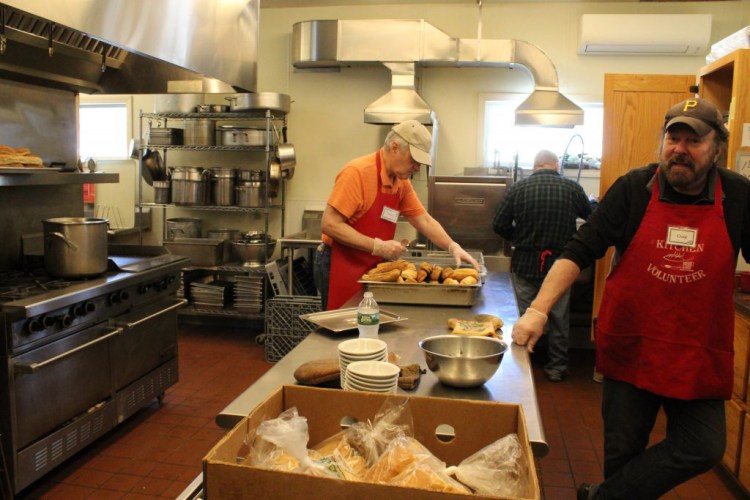BRUNSWICK — The Midcoast Hunger Prevention Program in Brunswick and the Bath Food Pantry both experienced “staggering” increases in visitors in January and February, with the trend stretching into March.
January and February were the two busiest months on record for Midcoast Hunger Prevention with more than 4,000 visits per month – a 25 percent increase from February 2018 – according to Hannah Chatalbash, development director.
This is in part due to the 35-day government shutdown from Dec. 22 to Jan. 25, food bank officials said. In January, people received two months worth of food stamps at once, and at the beginning of March, the Working Families Supplement benefit for those receiving Supplemental Nutrition Assistance Program funds more than tripled from $15 to $50 per month for the roughly 13,000 participants who qualified.
“Anytime there’s a disruption to a system that people rely on,” there will be impacts, Chatalbash said.
One woman was in tears at Bath Food Pantry this month because she was hoping she wouldn’t be forced to come, Executive Director Kimberly Gates said. But with her food stamps arriving early, she was out of food by the second half of the month and needed assistance.
The regular food stamp schedule is expected to resume in April, the Department of Human Health and Services said.
For Midcoast Hunger Prevention, the influx of visitors put more of a strain on the building than the food supply, which is pretty stable right now, Chatalbash said.
While they were still able to feed everyone at Bath Food Pantry, Gates said that as a smaller pantry, they were not as prepared for the increased demand. On average, there are about 200 to 210 visits per month, but right now the numbers are hovering around 240 to 250, which is “exceptional for us,” she said.
This month, in particular, there has been a drastic increase in the number of new families, a trend Gates has been unable to explain.
“After 17 years, I can generally predict how busy it is going to be,” she said, but while the usual new family number is generally between eight and 15, with 15 being unusually high, March saw 27 new families.
Bath Food Pantry moved to a new location in August, and being downtown has allowed it to serve more families than ever, Gates said, which could also be a factor.
Karen Parker, executive director of Midcoast Hunger Prevention, thinks part of their increase in visitors is due to word of mouth, with more people learning about their services.
Last year, the soup kitchen served 370,000 meals, an increase of 50,000 in just two years, meaning the government shutdown is not the only factor in play.
“People are having to make tough choices” between rent, heat, food and other costs, Parker said.
Maine’s poverty rate hovers around 13 percent, and according to the Maine Center of Economic Policy, almost half of Mainers are living paycheck to paycheck, with 45 percent of families unable to cover a $400 emergency expense.
“It’s so expensive for people to live in the community, and it’s not getting any better,” Parker said.
hlaclaire@timesrecord.com
Send questions/comments to the editors.



Success. Please wait for the page to reload. If the page does not reload within 5 seconds, please refresh the page.
Enter your email and password to access comments.
Hi, to comment on stories you must . This profile is in addition to your subscription and website login.
Already have a commenting profile? .
Invalid username/password.
Please check your email to confirm and complete your registration.
Only subscribers are eligible to post comments. Please subscribe or login first for digital access. Here’s why.
Use the form below to reset your password. When you've submitted your account email, we will send an email with a reset code.